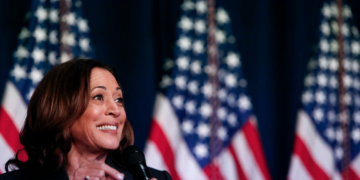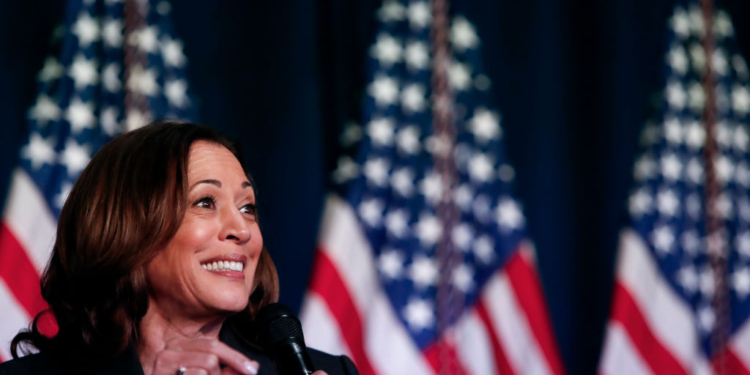As President Joe Biden stopped his reelection bid Sunday, all eyes appeared turned to his Vice President Kamala Harris.
When Biden announced his decision to drop out of the race, he endorsed Harris as the next Democratic nominee for president.
In a post on X, formerly Twitter, Biden wrote, “Today I want to offer my full support and endorsement for Kamala to be the nominee of our party this year.”
Harris as broken many glass ceilings in her career, including when she became the first woman, first Black person and first Asian American to become vice president, per the Washington Post.
As Biden’s endorsement inches her closer to possibly becoming the first female president, people are seeking more information on Harris — who she is, where she came from, and what she can offer America.
EARLY YEARS
Harris was born Oct. 20, 1964, in Oakland, Calif. Her parents are Shyamala Gopalan from India, and Donald Harris from Jamaica.
Both immigrated to the United States and met at the University of California at Berkeley. The have another daughter, Maya, per the outlet.
Her parents were activists and Harris to civil rights marches while she was still in a stroller, according to her White House biography.
Her parents divorced when she was 7. Her mother who became her primary caregiver.
“My mother understood very well that she was raising two Black daughters,” Harris wrote in her autobiography, “and she was determined to make sure we would grow into confident, proud Black women.”
When she was 12, Harris moved to Quebec, Canada, with her mother and sister, the Post reported.
EDUCATION
She came back to the United States and studied at Howard University, a historically Black school in Washington, D.C.
While at Howard, she majored in political science and economics.
She spent many weekends protesting apartheid in South Africa. She participated in a sit-in to protest the removal of the student newspaper’s editor.
She earned a law degree in 1989 from the University of California at Hastings and was admitted to the State Bar of California in 1990.
WORKING IN LAW
Harris became an assistant district attorney in the Alameda County prosecutor’s office in Oakland. There, she specialized in prosecuting child sexual assault cases.
She then served in the San Francisco District Attorney’s Office. While there, she prosecuted serial felony offenders as the office’s managing attorney for its Career Criminal Unit. She then led the San Francisco City Attorney’s Division on Families and Children.
PERSONAL LIFE
In 2014, Harris married Doug Emhoff, a lawyer in Los Angeles. Her sister, Maya, officiated. Emhoff’s two children from a prior marriage — Ella and Cole — started calling Harris “Momala.”
WORKING IN POLITICS
Harris ran for San Francisco district attorney in 2003 and won, making her the first African American woman and South Asian American woman in California to hold the office. Then, seven years later Seven years later, she was elected California’s attorney general. Again, she was the first African American woman and South Asian American woman in California to hold the office.
Parts of Harris’ record in politics has been seen as controversial.
This includes her decision as attorney general to threaten to charge parents of truant students. Some jurisdictions sent parents to jail while enforcing the policy. Harris called those jailings “unintended consequences.”
As attorney general, she supported the use of body cameras, but she did not implement statewide standards for the use of the cameras. She also opposed a bill that would have required the attorney general’s office to investigate police shootings.
As district attorney, she refused to prosecute death penalty cases — even in a substantial case involving the killing of a police officer.
In 2016, she ran a successful bid for the U.S. Senate.
With this win, she became only the second Black woman to join the Senate.
While in the Senate, she used her prosecutorial skills to question Trump’s nominees and appointees during committee hearings.
Harris, who served on the Senate Judiciary Committee, questioned then-U. S. Supreme Court nominee Brett M. Kavanaugh on whether he knew of any laws that tell a man what to do with his body since abortion laws do for women. Kavanaugh became flustered him and said he did not.
In 2019, Harris announced her cat for president. During the first Democratic presidential primary debate, Harris’s stood out when she went after Biden.
Harris, the only Black candidate on the stage, called out Biden for comments he previously made. Biden said he was good at bringing people together by citing his relationships with segregationists in the Senate in the 1970s as proof.
Harris countered that Biden’s comments were “hurtful to hear.”
Harris dropped out of the race in December 2019, blaming financial struggles as the primary reason behind her exit.
In the summer of 2020, Biden picked her to be his running mate as he had promised to put a woman on the ticket.
“This morning, all across this nation, little girls woke up, especially little Black and Brown girls who so often may feel overlooked and undervalued in our society,” Biden said. “But today, maybe, just maybe, they’re seeing themselves for the first time in a new way.”
When Biden won the election in November 2020, Harris became the first vice president-elect in recent history to deliver a victory speech along with the president-elect.
Harris said that she was doing something no one like her had ever done.
“Tonight, I reflect on their struggle, their determination and the strength of their vision — to see what can be, unburdened by what has been. And I stand on their shoulders,” she said of those who came before her. “And what a testament it is to Joe’s character that he had the audacity to break one of the most substantial barriers that exists in our country and select a woman as his vice president.”
As vice president, she tackled the issue of immigration and voting rights.
A turning point in her vice presidency came with
the Supreme Court’s decision in 2022 to overturn the fundamental right to abortion established in 1973 in Roe v. Wade.
Harris has spoken about restrictions on abortion and became the first sitting president or vice president to visit a health center that provides abortions.
In endorsing Harris for the Democratic Party’s nominee in 2024, Biden wrote, “My very first decision as the party nominee in 2020 was to pick Kamala Harris as my Vice President. And it’s been the best decision I’ve made.”

























